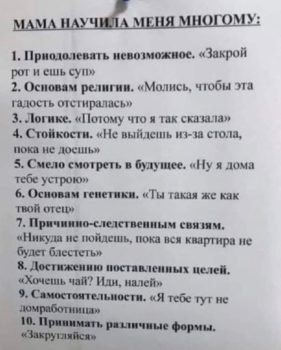Thanks, mama. Posted by bota on Nov 22, 2021 in Culture, Grammar
Understanding humor in another language is a whole new level of engaging with it. Those learning Russian know that Вели́кий и Могу́чий Ру́сский Язы́к 1The Great and Mighty Russian language, being the rich language that it is, loves to indulge in word play and irony. That can be a bit confusing, but with practice and exposure to more Russian jokes, you will soon find yourself not only chuckling at анекдо́ты и прико́лы 2jokes and gags but coming up with a few of your own in conversation.
A couple of my friends forwarded me the post below and I thought it was funny and quite telling of the way Russian humor works. Most of its humor is straight-forward about making fun of things that moms stereotypically do, however a few points require a bit of grammar reference. Back in 2013 Rob has done a similar thing – check out his wonderful blog here.
*And by the way, the forwarded picture above has a grammatical error. Let me know in the comments if you caught it 😉
Now, the overarching theme of this joke post is the juxtaposition of the formal way the “mom lessons” are labeled and the flashback one-sentence examples that are followed. However, there are a few grammar points that are worth going over.
Ма́ма научи́ла меня́ мно́гому (My mom taught me a lot of things):
-
Преодолева́ть невозмо́жное. «Закро́й рот и ешь суп»
Do the impossible. “Shut up and eat your soup.”
The Russian joke makes it especially funny because закро́й рот is literally “close your mouth”, which is the opposite of what one does when eating soup. Another way you could say “shut up” is “замолчи́” which is a bit less rough, though, now that I think of it, there isn’t really a polite way to tell someone to stop talking.
-
Осно́вам рели́гии. «Моли́сь, что́бы э́та га́дость отстира́лась»
Religious foundation. “Pray that this ghastly thing comes off.”
Га́дость is such a great Russian word. Remember, Иро́ния Судьбы и́ли С лёгким паром? This scene in the movie where he says “Какая га́дость, какая га́дость, э́та ва́ша заливная ры́ба!” (“What a ghastly thing is this fish aspic dish of yours!”) is all the definition you need to understand just how disgusting, abominable, and ghastly something is when you have to call it га́дость.
-
Ло́гике. «Потому́ что я так сказа́ла»
Logic. “Because I said so.”
Russian moms are famous for answering the “Почему́?” with “Потому́ что!”
-
Сто́йкости. «Не вы́йдешь из-за́ стола́, пока́ не дое́шь»
Resilience. “You are not leaving the table until you finish your plate.”
-
Смело смотре́ть в бу́дущее. «Ну я дома тебе́ устро́ю»
Look out into the future bravely. “I’m gonna scold you when we get home.”
Устрою can be a very confusing verb here. You might think: “Is the mom going to build something or is it about setting someone up with a job? Isn’t устроить also used to talk about organizing parties?” Строить means to build, устроить на работу is to get someone a job, устроить вечеринку is to organize a party. Устроить on its own can also mean “give someone a good talking to”.
-
Осно́вам гене́тики. «Ты такая же как твой оте́ц»
Foundations of genetics. “You are just like your father.”
-
Причинно-следственным свя́зям. «Никуда́ не пойдёшь, пока́ вся кварти́ра не бу́дет блесте́ть»
Cause-and-effect relations. “You are not going anywhere until the whole apartment is clean.”
-
Достиже́нию поста́вленных целей. «Хо́чешь чай? Иди́, нале́й»
Reaching your goals. “You want tea? Go and get it.”
-
Самостоя́тельности. «Я тебе́ тут не домрабо́тница»
Independence. “I’m not your maid.”
-
Принима́ть разли́чные фо́рмы. «Закругля́йся»
Assume many forms. “Wrap up.”
This last one is a killer joke once you understand the verb “закругляться”. At its root is the noun “круг” which is a ‘circle’. There is a verb “закргулять” which can be used literally, as in “закруглять углы фото” ‘round the corners of the photo’. But as soon as you add the reflexive –ся this verbs means “to wrap up/to finish up”. That’s why “mom’s lesson #10” talks about “формы” (forms) – it’s a play on the word ‘закругляться’ which can be jokingly read as “become a circle” but really means “finish up whatever you are doing”.
- 1The Great and Mighty Russian language
- 2jokes and gags

Build vocabulary, practice pronunciation, and more with Transparent Language Online. Available anytime, anywhere, on any device.








Comments:
Ph:
Of the spelling error type.
bota:
@Ph Точно! Молодец)))